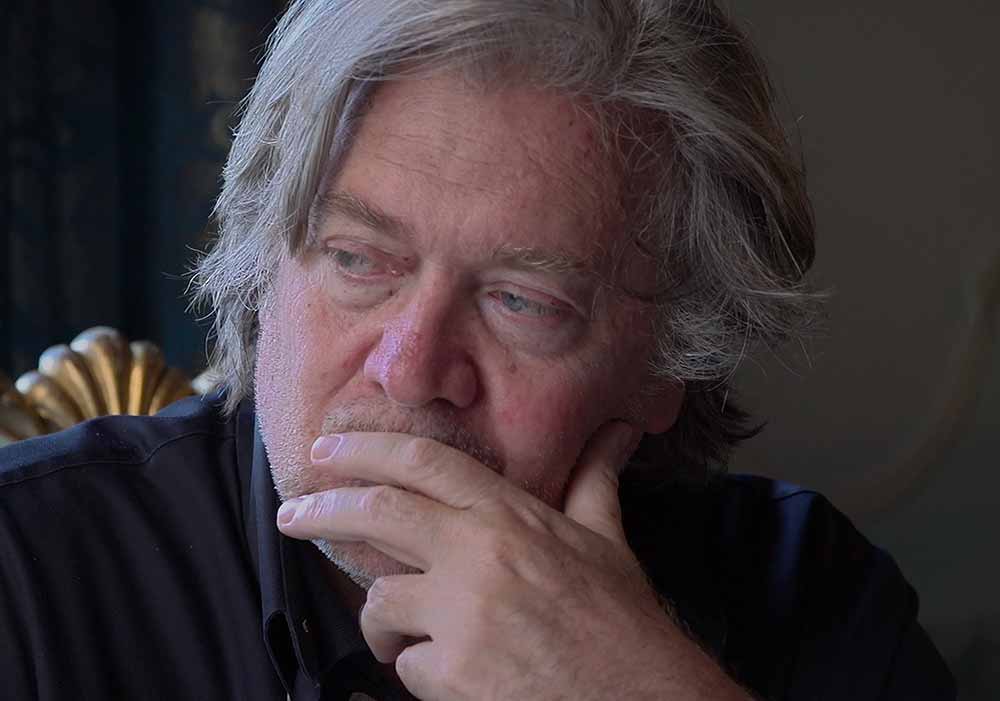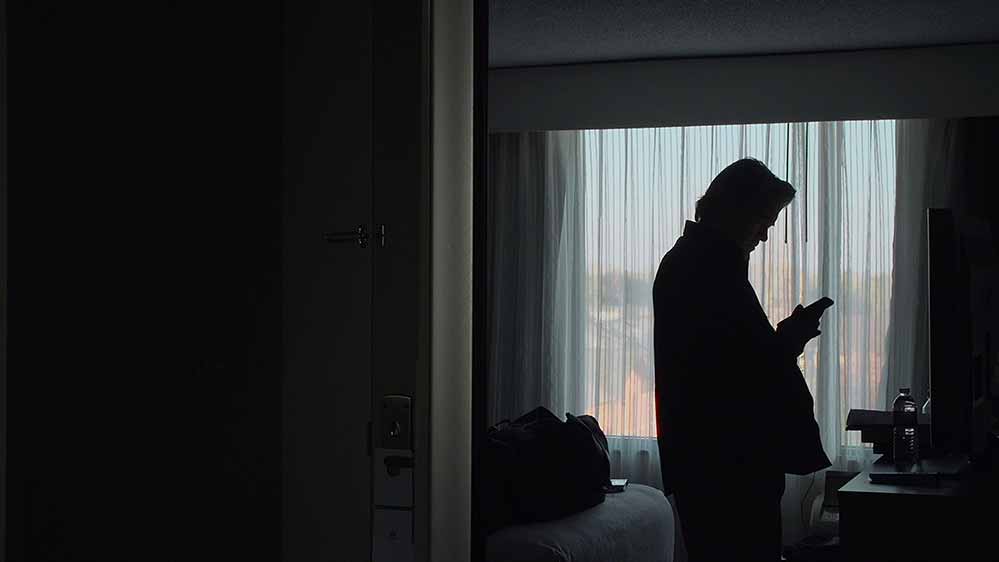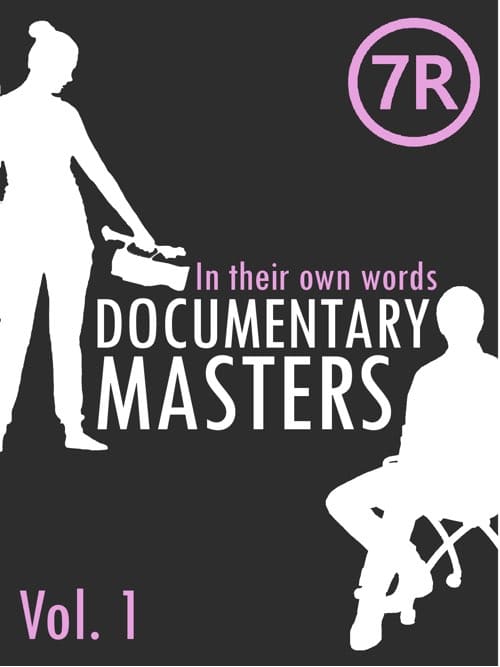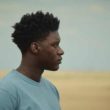Alison Klayman discusses her new documentary, The Brink, a character study of Steve Bannon that spans a year.

The Brink begins with Steve Bannon discussing the mechanics of Nazism and Hitler’s rise to power. He’s critical, of course — no political figure wants to be seen praising the literal Nazis — but the irony is inescapable. This is a man who incites hatred and violence proving that he knows exactly how Hitler manipulated the public to follow his own beliefs. We cut straight from that to Bannon making breakfast. All of a sudden, we have to confront the fact that Bannon is a person who goes through the same mundane rituals as the rest of us.
A key focus of Alison Klayman’s documentary The Brink is this contrast between Bannon’s sickening political machinations and his quite friendly and ‘relatable’ every day persona. The Brink isn’t a cold, removed political study, but rather, a study of the real people behind the political monsters of our time. In understanding Bannon, we can better understand how the alt-right works and how people like him come to be.
I talked to Alison Klayman about The Brink, how she gained such intimate access to Bannon’s life and her views on whether a film can ever be “politically neutral.”
Seventh Row (7R): So first of all… how the hell did this happen? How did you get this kind of access to Steve Bannon for The Brink?
Alison Klayman: My producer is a woman named Marie Therese Guirgis. She knew Bannon from the early 2000s, back when he was in the investment banking space, in the wannabe Hollywood era of his career. He bought a film distribution company that she worked at, so he became her boss for three years. Then, the company folded.
When he joined the Trump campaign in the fall of 2016, she got back in touch with him, really to send him hate mail and rage text him like, “This is terrible. Why are you doing this?” Of course, that didn’t matter at all and had no impact on his actions. But it did put them back in touch. She had the idea to do a documentary because his image in the press was so one-dimensional: even though it was sinister and evil, it was also very powerful, and she felt that was something he could use to his advantage. It was a disservice to the public to not really understand him when he’s in such a position of power.
It was always conceived of as a verité film because watching him reveal himself is much more beneficial than sitting down for an interview with him. He said no several times, and then he said yes. I was the first call. I was totally down from the beginning because it seemed like an opportunity, if it could really happen, to get behind closed doors on the far right and the Republican party, and I was very interested in that. But I said, “I have to meet him, because I don’t know what he’s like, and I also don’t know if I can stand it. It’s going to be very intimate if we do this.” I met him in September of 2017, and he walked in and started talking, and I was like, “Oh man, he’s going to be a very good character.”
7R: I was surprised by the things he was willing to say and do on camera. Why do you think he felt comfortable letting you film all of that for The Brink?
Alison Klayman: It definitely builds up over time. My access grew over the 13 months.
I’ve done documentaries in this style before, and my goal is to be the fly on the wall. What I’m seeing is what would happen anyway, and what people say to me… they’re being honest. I try to create those conditions, and in this case, I treated everything he said to me with the highest level of suspicion, which I kind of do with every film. Even if it’s someone I agree with or support, I still feel like I’m always aiming for something that feels real and authentic. That’s the lens I always have on: the bullshit detector.
He may not be an intellectual, but he is very savvy and smart as a communicator. My daily mantra was: let him be underestimating me, and let me never underestimate him. I was very concerned with what he was doing to try to use me. But I felt like, on my part, it’s just me with a camera. I’m very professional, but I also feel like if that makes him think, “How bad could it be? It’s just her with a camera,” I don’t mind. I do think people tend to underestimate women, as well, so I hoped that that would be the case.

7R: The Brink tries to humanise this very controversial figure. It’s not just about his political views: we see his diet plans and everyday things like that. Why do you think it’s important to understand the humanity of a person you disagree with?
Alison Klayman: My goal was not to humanise him in the sense that, “Oh, does he love his dad? Did he have any pets growing up?” There were certain storylines I purposefully did not pursue because I didn’t think it was in the public interest. But to view him as a human is of the utmost importance.
All atrocities that have been committed were all done by people. Hitler was a person, not to go incredibly hyperbolic. This is the stuff that was driving why I thought this project was important. I think that if you make him out to be a monster, it’s actually safer, because then maybe there’s only one of him, or a few of him; he’s an extreme case, and he’s other. The reality is… I mean that’s why the movie starts the way it does, too, [showing Bannon going about his day to day life]. It’s the banality of evil, the day in day out of what people’s lives look like who are inciting violence or advocating for policies that are incredibly violent and hateful. They’re people, too. It’s not about making him more appealing or more warm and cuddly, but just facing the reality that he’s a person.
7R: What was your approach to the politics of The Brink? Technically, you’re just presenting what he’s doing without commentary, so you could argue that the film is politically neutral. But obviously, you have a distinct perspective on him. How much did you want that perspective to come through?
Alison Klayman: I reject the term “neutral” when it comes to the film, but I do think that the film is fair. It’s not in the style of a Michael Moore. My voice is in there. I always like that. You hear me, sometimesl, in films, but the goal was not ‘My Travels with Steve Bannon.’ It’s not really about me.
But I think that you have to bring a political perspective. Filmmakers should have a point of view in any film that they make, and I brought my politics and my values to the table. To treat him fairly, what it took was to not assume anything about him and to let everything be proven and revealed to me. But what that doesn’t mean is I have to check every political idea. Every concept of right or wrong doesn’t get checked at the door when I meet him. It’s not up for debate, “Is it right to separate families at the border?” You don’t need to question your fundamentals as an artist or journalist or filmmaker. You have to bring them to the work.
I was also pushing myself to be like, “What about this film makes it my film and not like another left-leaning filmmaker came in and did it? I think the humour in it is an eye that I bring, the absurdity. I think things like the “rose between two thorns,” [a phrase Bannon keeps repeating whenever he takes a photo with a man and a woman], I certainly wonder if a male filmmaker would have obsessed over that in shooting. I think once I brought it to the edit, it’s clearly funny, and I pointed it out.
Then there’s my Jewish identity. My grandparents are Holocaust survivors. The film, at the very end, is dedicated to them. The events of the year ended up making that storyline come to the forefront. But I think the opening of the film [, where Bannon discusses Nazism and the Holocaust,] was like that because of what I was interested in. I saw that as an incredible piece of tape.
7R: How did you know when it was over? When did you decide to stop shooting? It’s the story of modern politics, so it’s always ongoing…
Alison Klayman: I felt I had that experience when filming Ai Weiwei. I spent three years filming that film. I knew that the movie wasn’t going to end because this guy comes to an end. It’s going to end once I have enough of a story to tell.
In this case, I always planned to film until the mid-terms, because I hoped that something would be drawn to a close. I didn’t know he was going to be so active in them when I first set out to do it. But I also felt like it was going to be a national referendum on the Trump administration and the Trump agenda, so I picked that as the end. It was nice to be able to take the microphone from him and wrap it up.


